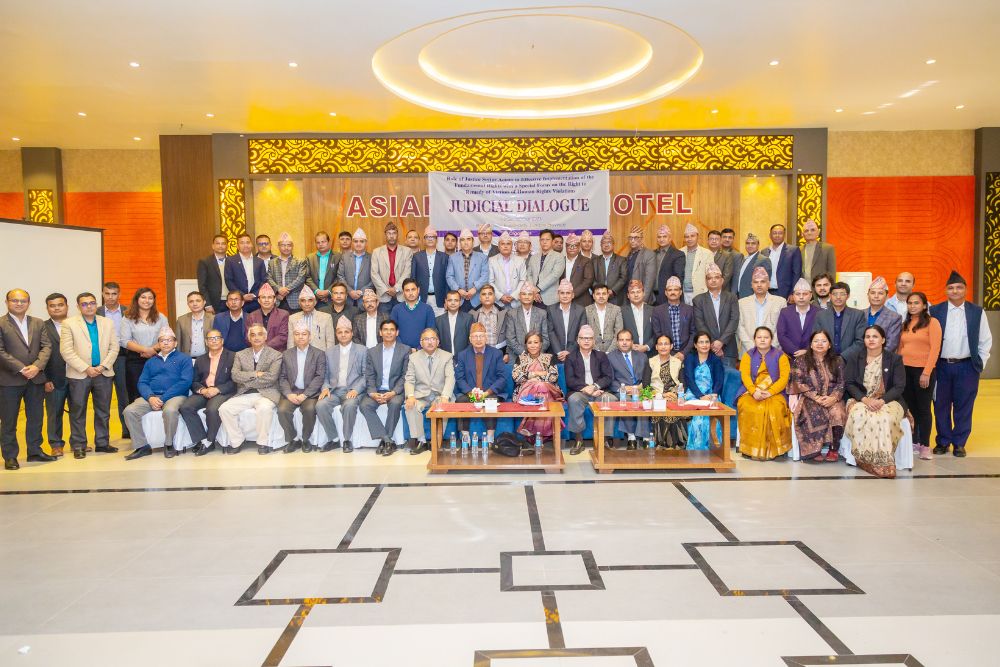Judges and prosecutors in the province of Lumbini, where a high number of cases involving extra-judicial killings and enforced disappearances from 1996-2006 have been filed, pledged to enhance their efforts to ensure access to justice for victims/survivors, as they concluded a two-day judicial dialogue with several justices of the Supreme Court of Nepal.
The judicial dialogue was organized by the International Commission of Jurists (ICJ) and its partner, Advocacy Forum Nepal (AFN), in collaboration with the Judges Society Nepal (JSN), on 1 – 2 December 2023. More than 50 Judges and prosecutors working at the provincial, district and local levels in Lumbini, identified ongoing challenges faced by victims and survivors of violations and abuses during the 10-year internal armed conflict. They jointly evaluated the progress of Nepal’s transitional justice process, applying national and international law and standards, including Supreme Court directives and international best practices.
Participants highlighted the roles and responsibilities of jurists in the ordinary justice system in delivering justice in conflict-era cases involving allegations of gross human rights violations and abuses and the persistent obstacles. In discussing the role of the courts, the police and prosecuting agencies in dealing with such cases, participants expressed concern about the serious and unwarranted delay in the establishment and operation of Nepal’s transitional justice arrangements, which includes the failure to amend them in accordance with country’s international legal obligations .
All major political parties over the many years have promised to ensure justice for victims/survivors of gross human rights violations and abuses during the conflict, and judgements from the Supreme Court have affirmed Nepal’s legal obligations to establish an effective system for access to justice, in accordance with international and domestic law. Nonetheless, victims/survivors have been waiting for over 17 years for reparation. To make matters worse, they continue to be denied redress through the regular justice system on the pretext that they will be provided access to effective remedies through a separately created transitional justice process.
ICJ Commissioner, and former Chief Justice of the Supreme Court of Nepal, Kalyan Shrestha, emphasized that Nepal’s approach to transitional justice must be guided by the jurisprudence of the Supreme Court, which is grounded in international human rights law and domestic law. He stressed that alleged perpetrators of gross human rights violations and abuses constituting crimes under international law must not be exempted through grants of immunity.
“As justice actors, we should overcome difficulties using our creative judicial mind to address challenges in pursuit of dispersion of justice. Also, we should not be complaining about the ‘State’ but rather making best efforts to accomplish tasks entrusted within us using our creative faculties and knowledge,” stated ICJ Commissioner Shrestha, during his keynote speech.
Justice Sapana Pradhan Malla of the Supreme Court of Nepal underscored the importance of adopting an approach whereby the justice sector not only prioritizes delivering justice in the cases brought before it, but also takes steps to ensure that the system is accessible to all victims seeking legal remedies. Justice Ananda Mohan Bhattarai of the Supreme Court of Nepal emphasized the importance of resolving an estimated 1000 cases brought by victims/survivors and their families, which are currently pending before various courts, the police and government attorney offices throughout country.
Mandira Sharma, ICJ Senior Legal Advisor, provided insights into the global context of transitional justice and discussed the challenges, lessons learned, and best practices. She noted that Nepal’s Parliamentary Sub-Committee, tasked to make necessary changes in the TRC Act Amendment Bill, had not yet addressed the most significant concerns put forward by victims/survivors and civil society, including the provisions that may effectively provide amnesty to perpetrators of human rights violations and abuses.
Participants appreciated the conceptual clarity provided by the judicial dialogue and the encouragement that they received from the Supreme Court justices on how to approach such cases.
This judicial dialogue is one in a series of several judicial dialogues being organized by the ICJ and its partners with judges and public prosecutors across the country.
Contact:
Mandira Sharma, ICJ Senior International Legal Adviser, t: +9779851048475, e: mandira.sharma@icj.org
Kashiram Dhungana, ICJ National Legal Adviser, Nepal, t: +9779851226964, e: kashiram.dhungana@icj.org




